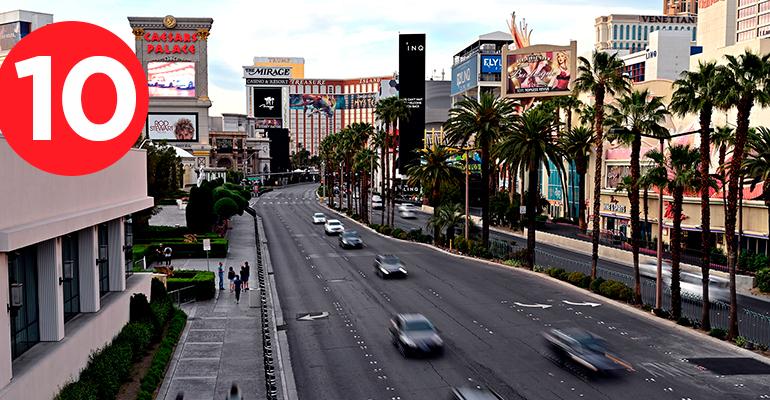- How Las Vegas Became Ground Zero for the Jobs Crisis “As the bottom fell out of the American economy, few places were hit harder than Las Vegas, where a full one-third of the local economy is in the leisure and hospitality industry, more than in any other major metropolitan area in the country. Most of those jobs cannot be done from home. Nearly 350,000 people in Nevada have filed for unemployment benefits since the crisis began, the highest number in the history of the state.” (The New York Times)
- Biggest Hurdle to Bringing People Back to the Office May Be the Commute “As corporate executives plan how to safely bring employees back to work in the office, a thorny issue has arisen over which they have no control: public transportation. The mass transit systems that allowed some of the world’s most densely populated financial capitals to grow and flourish for a century, including New York City and Tokyo, are emerging as a major concern because of the novel coronavirus pandemic. Challenges with commuting could keep offices in those locations shut for longer than other places where people can more easily drive to work, human resources and real-estate executives say.” (Wall Street Journal, subscription required)
- Homebuilders Suddenly See Sales Jump as Renters Flee Small Urban Apartments “In the initial four weeks of the national shutdown, sales of newly built homes began falling precipitously, down 85% from normal spring activity by the fourth week. In the past two weeks, however, the numbers have started to climb, according to John Burns Real Estate Consulting, which tracks hundreds of builders nationwide.” (CNBC)
- BlackRock CEO Larry Fink Sees More Remote Work Hampering Commercial Real Estate “BlackRock Inc. Chief Executive Officer Larry Fink said the work-from-home revolution will have lasting effects, including pushing down demand for commercial real estate. Fink said that after businesses were forced to run from mostly remote setups during the coronavirus crisis, many companies will choose not to bring all their workers back to the office even when it is safe to do so.” (Crain’s Chicago Business)
- Out of Flour? Try the Local Wine Bar “Many restaurant owners said they were torn about how to move forward during the coronavirus outbreak. While staff members pleaded to be called into work, owners had to weigh the risks of spreading the virus and to question whether their cooking was really an essential service. This is what led some of them to sell supplies, along with a desire to keep skeleton crews working.” (The New York Times)
- The Reach for Yield Is Alive and Well “Investors are snapping up complex securities linked to some of the markets deemed most vulnerable to the coronavirus-driven economic slump, a sign that the yearslong reach for yield has survived the market shock. Faced with withering share prices and falling yields on safe government bonds, portfolio managers are seeking out returns in an array of strategies that in some instances take them into esoteric corners of the financial markets.” (Wall Street Journal, subscription required)
- 7 Major U.S. Cities That Could Be Facing a Tech Job Apocalypse “As businesses try to stay afloat during economic strains from the pandemic, we wanted to to see which cities could be most affected by the latest and upcoming job losses in the tech sector. To do so, we looked at a recent Brookings Institution analysis of where US tech jobs are concentrated.” (Business Insider)
- Some NYC Grocery Chains Say Hazard Pay Would Force Layoffs, Store Closures “Last week, the New York City Council introduced sweeping legislation, which among other things would ensure grocery stores with more than 100 employees would have to pay their workers extra during the COVID-19 pandemic as a type of hazard pay. But some grocery chains in NYC say they are worried that they will be forced to layoff workers and close stores if the proposed legislation becomes law, the Real Deal reports. The legislation would require employers to pay hourly workers $30 for shifts under four hours, $60 for shifts that go between four and eight hours, and $75 for shifts that last longer than that.” (Eater)
- Welcome Back, Cubicles? Longtime Silicon Valley CEO Says Coronavirus Could Kill the Open Office “Instead of the old office cubicles separating desks, ‘They probably will be clear, you will not sit there in that big open space. I think people are going to want protection, plexiglass or whatever. There will also be more teleconferencing, absolutely less flying — you will teleconference with customers,’ Bartz said. ‘They don’t want to see you in person, and you don’t want to see them.’” (MarketWatch)
- Online Apartment Shopping Activity Reveals Renewed Interest in Renting “Online search activity in April shows a surge of renewed interest by prospective renters in getting back into the game after putting their apartment hunting on pause. Searches for apartments dropped sharply in mid-March when shelter-in-place orders began to take effect to combat the spread of COVID-19. Analysts for RENTCafé, an apartment listing website, saw a 25% decline in the number of renters searching for apartments from March 11-17 as Americans began adapting to a temporary normal.” (Forbes)
0 comments
Hide comments

